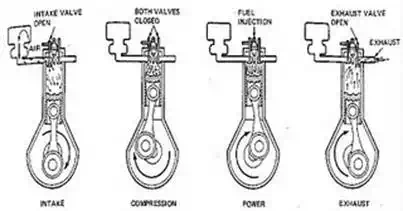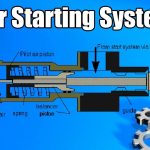
Above: 4-stroke Diesel Engine timing diagram
| Stages | Piston Motion | Temp. Of Compressed Air (°C) | Pressure of Compressed Air (Bar) | Exhaust Valve | Scavenge Port |
| Induction | Downwards | – | Open | Closed | |
| Compression | Upwards | 550 | 80-90 | Closed | Closed |
| Expansion | Downwards | 1650 | 180 | Closed | Closed |
| Exhaust | Upwards | – | Closed | Open |

Fig: Four-stroke cycle diagram
Induction Stroke:
· Piston moves down with air inlet valve open and all other valves closed.
· Fresh air is drawn into the cylinder from the atmosphere and suction valve is closed once the cylinder is filled up.
Compression Stroke:
· Piston moves up with all valves closed.
· Swept volume of air is compressed to 80-90 bar with temperature raised to about 550°C.
· High pressure fuel is then injected into cylinder at around 10-15° before TDC to give sufficient time for the fuel to mix with air for proper combustion (ignition delay).
Expansion Stroke:
· When the piston is close to TDC, the compressed air–fuel mixture is ignited by the heat and pressure of compression.
· The pressure from the combustion of the compressed fuel-air mixture drives the piston back towards the BDC, with all valves in the cylinder head close.
· Gas in the cylinder reaches a high temperature of about 1650°C.
· Energy from the combustion process is imparted on piston, thus converting the reciprocating motion to rotary motion.
Exhaust Stroke:
· When piston goes past TDC, burnt gases are pushed out of cylinder through opened exhaust valve.
· Inlet valves opens towards the end of exhaust stroke to cool the combustion chamber and assist in pushing the remaining gases out of the cylinder.
· Exhaust valves closes about 40° after TDC and new cycle begins.


